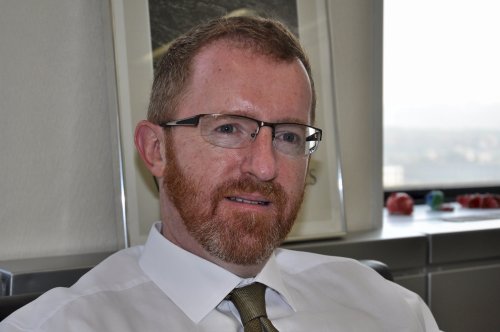The Irish Department of Foreign Affairs is no more; instead they have changed their name to the Department of Foreign Affairs and Trade.
The recent move will streamline their diplomatic and business presence around the world.
The nature of diplomacy has changed over the past few decades moving from a classic approach of dealing with political and diplomatic affairs into one that also handles economic matters.
“Your international economic activity defines more or less what you are in so many regards internationally,” said Ireland Ambassador Eamonn McKee to The Korea Herald.
The recent move will streamline their diplomatic and business presence around the world.
The nature of diplomacy has changed over the past few decades moving from a classic approach of dealing with political and diplomatic affairs into one that also handles economic matters.
“Your international economic activity defines more or less what you are in so many regards internationally,” said Ireland Ambassador Eamonn McKee to The Korea Herald.

Today, leading countries are defined by their economic presence on the world stage, something that was reflected during the G20 summit in Seoul last year.
“International trade, your economic vitality, your diplomatic presence are all related,” he said. “The capacity of a government to influence events is often determined by what funding you can bring to it.”
Part of what Foreign Ministries do economically is branding, that helps identify a country.
“Trade and diplomacy are nowadays inextricably linked and taxpayers expect that diplomacy pays for itself,” said McKee.
Ireland has a very successful aid program that allows the country to extend its reach by using funds to support projects that they deem necessary for the betterment of the country.
“Korea is developing its international aid program and that will give it much more diplomatic reach but again, that’s a function of Korea’s economic presence,” he noted.
The big name change does mean more responsibility for every Irish ambassador worldwide.
While in some ways the addition of trade to the Foreign Ministry changes the dynamics of the department, it also reflects a continuity of what many Irish embassies, including the one in Seoul, is doing.
“This means we will have the leading role for trade promotion for Ireland much the same way as MOFAT does here,” he pointed out.
The key organization will be the Export Trade Council which is chaired by the Irish Foreign Ministry and the Deputy Prime Minister’s office.
From there, DFAT will coordinate much more closely with Enterprise Ireland, the Industrial Development Authority of Ireland, and the agencies overseeing tourism and food promotion.
“This recognizes the importance of trade for Ireland and in terms of our economic situation at the moment, like Korea in the 1970s, you trade your way out debt situations,” McKee said.
What this means for Korea is that now the Irish Embassy in Seoul will be able to use the framework of the Korea-European Union free trade agreement to fully exploit the potential to develop trade.
“I would like to see more Korean investments in Ireland, see more Irish investments here in Korea, more trade and exchange. I hope that by being more effective in promoting Ireland we will also help increase the profile of Ireland,” he said.
For McKee, The sectors that look promising are Irish food exports, which “have been growing tremendously,” high-tech goods, pharmaceuticals, medical devices, biotechnology and financial services.
“If you look at our (Korea, Ireland) history and personalities, we are very similar in many ways, but the knowledge about Ireland here is widespread but not deep, I think the same in Ireland about Korea. So I think we can learn a lot from each other and learn how much we have in common,” he said.
By Yoav Cerralbo (yoav@heraldcorp.com)







![[Graphic News] More Koreans say they plan long-distance trips this year](http://res.heraldm.com/phpwas/restmb_idxmake.php?idx=644&simg=/content/image/2024/04/17/20240417050828_0.gif&u=)
![[KH Explains] Hyundai's full hybrid edge to pay off amid slow transition to pure EVs](http://res.heraldm.com/phpwas/restmb_idxmake.php?idx=644&simg=/content/image/2024/04/18/20240418050645_0.jpg&u=20240419100350)





![[From the Scene] Monks, Buddhists hail return of remains of Buddhas](http://res.heraldm.com/phpwas/restmb_idxmake.php?idx=652&simg=/content/image/2024/04/19/20240419050617_0.jpg&u=20240419175937)

![[KH Explains] Hyundai's full hybrid edge to pay off amid slow transition to pure EVs](http://res.heraldm.com/phpwas/restmb_idxmake.php?idx=652&simg=/content/image/2024/04/18/20240418050645_0.jpg&u=20240419100350)

![[Today’s K-pop] Illit drops debut single remix](http://res.heraldm.com/phpwas/restmb_idxmake.php?idx=642&simg=/content/image/2024/04/19/20240419050612_0.jpg&u=)